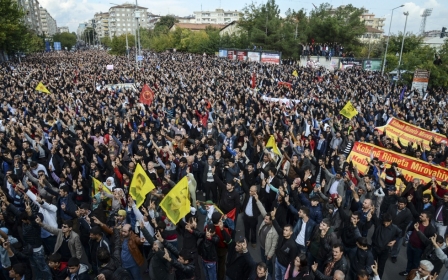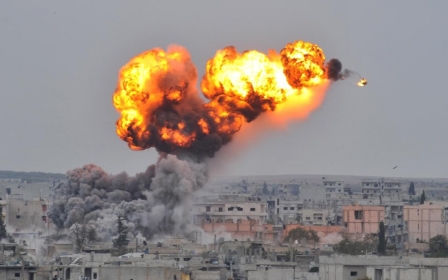Small number of Kurds reportedly fighting alongside IS in Kobane: officials

Ethnic Kurds are working with Islamic State (IS) militants in the fight against Kobane, a number of Iraqi and Kurdish officials have claimed.
According to the officials, Kurds are fighting alongside IS and are providing key intelligence about local terrain.
The Associated Press report, published on Tuesday, cites sources from within the People's Protection Units, or YPG, as saying that the Syrian Kurdish leadership has known about these fighters for some time.
Shorsh Hassan, a YPG spokesman in Kobane told AFP that the majority of the Kurdish fighters working with IS were from Iraq but that some had come from Syrian regions such as Kobane, Afrin and Jazeera.
"The fighter who is from Kobane is not like someone who hails from Chechnya with no idea about tracks and roads," Hassan said.
However, the number of Kurdish fighters battling alongside IS is believed to be small. Dana Jalal, an Iraqi journalist who specialises in IS, estimates that there are no more than 70 Iraqi Kurds fighting with the 3,000 estimated IS militants.
Much of the controversy comes down to an Iraqi Kurd, known as Abu Khattab al-Kurdi, who has allegedly been helping IS and working to recruit other Kurdish fighters.
An Iraqi official collaborated the reports, with an unnamed official telling AP that Kurdi comes from Halabja – a city in Iraqi Kurdistan that witnessed a large-scale chemical weapons attack by forces loyal to former president Saddam Hussein in 1988.
"Our latest information is that he is in Syria fighting in the Kobane area,” the Iraqi official said, speaking on condition of anonymity.
“He is an expert in mountainous areas. He is commanding the Kurdish group within Daesh [the Arabic name for Islamic State] because he is a Kurd," he added, while explaining that Kurdi had long been wanted by the Iraqi authorities.
The report comes as the Islamic State reportedly freed at least 93 Syrian Kurds from the flashpoint town of Kobane, which has seen almost two months of heavy fighting between IS and Kurdish forces, who are being backed by US-led anti-IS coalition airstrikes.
According to the Syrian Observatory for Human Rights, the prisoners were kidnapped while trying to cross into the anonymous Iraqi Kurdistan region in northern Iraq back in February.
They were then moved to and held in the IS stronghold of Raqqa in eastern Syria, however, between 50 and 70 other Kurds, who were seized at the same time, were not freed, the Observatory added.
It was unclear why the group was released, with most of the former prisoners making it north to Turkey but some remaining in Syria, the UK-based watchdog added.
New MEE newsletter: Jerusalem Dispatch
Sign up to get the latest insights and analysis on Israel-Palestine, alongside Turkey Unpacked and other MEE newsletters
Middle East Eye delivers independent and unrivalled coverage and analysis of the Middle East, North Africa and beyond. To learn more about republishing this content and the associated fees, please fill out this form. More about MEE can be found here.




